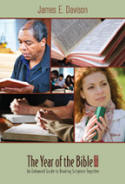 Micah 1-7; Nahum 1-3; Habakkuk 1-3; Zephaniah 1-3; Haggai 1-2; Psalms 144-145; Revelation 12-16
Micah 1-7; Nahum 1-3; Habakkuk 1-3; Zephaniah 1-3; Haggai 1-2; Psalms 144-145; Revelation 12-16
As we get close to the end of December, we are reading a lot of minor – as in short – books of the prophets. It’s easy to read through them wondering what they’re about, because the setting for their prophecies isn’t always clear, and they love to speak in images. But don’t skim through them too quickly, certainly not when you get to Habakkuk.
Habakkuk has a wonderful testimony of absolute faith at the end of his three chapters. Listen especially to these words: “Though the fig tree does not blossom, and no fruit is on the vines; though the produce of the olive fails, and the fields yield no food; though the flock is cut off from the fold, and there is no herd in the stalls, YET I will rejoice in the Lord!” (3:17-18) In other words, Habakkuk promises to exult in God regardless of whatever circumstances arise.
Earlier in the book, Habakkuk expresses outrage at evil in the world – first at his own people in Jerusalem (1:1-4), and later at the Babylonians, who God says he will use as an instrument to punish his people for their wickedness. (1:5ff). It’s the old story: we get mad at our own people, families, or friends, until some other nation or people come on the scene. Then we close ranks and defend our own…until the threat is gone. The Babylonians are Israel’s historic enemy, so Habakkuk isn’t about to say anything good about them. He is so upset, in fact that he becomes a bit sharp with God, questioning how God can persecute his people like this. (1:12-13)
With another school shooting this last week, Habakkuk’s outrage doesn’t seem misplaced. After all, as many are saying, how can God allow this sort of evil to happen? The answer, of course, is that we can’t explain it. Evil is something awful that’s in human hearts, and it is inexplicable. Years ago, my professor in Amsterdam, G.C. Berkouwer, wrote that we shouldn’t think of sin and evil as a “mystery,” because that’s too rational a term. Eventually, we may come to understand something that is mysterious (and in the specialized biblical use of the term, a mystery is something that is hidden from us now, but will be revealed at some point). So “mystery” is too positive a term for evil. Berkouwer said we should call sin and evil a “puzzle,” in the sense that it simply can’t be understood. It’s irrational; it wells up from the human heart, and it results in actions that just plain don’t make sense.
So, we can’t eliminate a “puzzle,” but we can try to limit the opportunities for it to arise. That means looking for those times and places that are most likely to offer occasions for these senseless acts, and seeking ways to control them. For the rest, we’ll have to live courageously and trustingly, realizing – as this season of the year tells us – that God has chosen to be with us, and to undergo in himself that same puzzle of evil and sin that we experience all too often in this world. And if we’ve got the faith that this prophet has, we’ll also proclaim that, regardless of what may happen, “yet we will rejoice in the Lord.”
_______
A closing note: I’ll be leaving for an extended vacation this week, so this will be my last blog until a couple weeks into January. I want to thank you for reading this year, and I wish you well as you finish the readings for “The Year of the Bible.” Congratulations! When you finish – whether now, or if you are behind, sometime next year (!) – you will have accomplished a worthwhile goal.
I am planning to keep writing next year, so if you have any suggestions, please do pass them on. And blessings to you for Christmas and the New Year!

Leave a comment